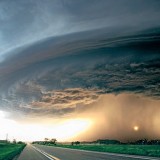One of the most insightful and profound poets of the 20th century was T.S. Eliot, and one of his most powerful poems was The Hollow Men, a disturbing portrait of a people paralyzed by doubt, uncertainty, confusion and a debilitating faith that nourished resignation rather than conviction and action. “We are the hollow men,” he wrote, “the stuffed men”, and “Our dried voices, when / We whisper together / Are quiet and meaningless / As wind and dry grass / Or rats’ feet over broken glass / In our dry cellar.” The poem ends with a simple, mindless and infectious incantation that anticipates a sorry future earned by default rather than intention:
“This is the way the world ends
This is the way the world ends
This is the way the world ends
Not with a bang but a whimper.”
Ecologists with a philosophical perspective are quick to remind us that the world is not going to end. It has already survived at least five other cataclysms that were as traumatic as anything we are capable of inflicting on it, so regardless of what we do, it will still be here. The future in question is not our physical planet but our civilization as we presently know it.
We get some glimpse of this future from the Canadian government’s advisory panel, the National Round Table on the Environment and the Economy. Its report, Paying the Price: The Economic Impacts of Climate Change for Canada, is “the first of its kind to analyze Canadian trends in the growth of greenhouse gas emissions, population and the economy in the context of climate change science” (Times Colonist, Sept. 30/11). The findings and implications are sobering.
If “governments reject the science that links human activity and greenhouse gas pollution to global warming” and do not actively and immediately undertake emission reductions, then we can expect very costly damage from flooding, rising oceans, extreme weather and ecological transformations that will cause “dramatic changes to the forest industry and other sectors” (Ibid.). By 2020 these costs are expected to be $5 billion per year, escalating to as much as $43 billion per year by 2050. This means that money being spent on health, education, infrastructure and services will be diverted to preventing or repairing damage done by climate change.
BC, with its coastal cities and inhabited shorelines, is particularly vulnerable. As ocean levels rise, dykes in the greater Vancouver area will have to be heightened and reinforced. Higher ocean levels mean rivers will evacuate less effectively so lowland flooding will be more common. Extreme rainfall will increase this risk. “The annual cost of flood damage to dwellings in British Columbia by the 2050s is estimated to be between $2.2 billion at the baseline level to $7.6 billion under the ‘high-climate change’ scenario” (Ibid.). (“Baseline level” probably means the costs to which we are committed by climate change conditions already set in motion.) The per-capita costs to British Columbians will be between $565 to $2,146 per year, a huge drain on the economic viability of our present way of life – not to mention the grief, loss, trauma and social stresses caused by the damage and dislocation. Unusual wind, snow and heat will add other costly complexities. The report concludes that, “Ignoring climate change costs now will cost us more later.”
Individual communities and provinces have initiated modest steps to avoid climate change by slowly reducing greenhouse gas emissions. BC, for example, has an escalating carbon tax and Ontario is phasing out coal-fired power plants. But BC’s insistence on exporting increasing quantities of coal and Alberta’s energy-intensive production of oil from its tar sands are counteracting these benefits.
Meanwhile, Canada’s emphasis has been on adaptation, a term that really means easing the consequences of climate change rather than preventing them. Despite having a goal of reducing greenhouse gas emission to 1990 levels within a vague 10 to 15 years, Canada’s casual measures do not match the urgency being advocated by climatologists. Furthermore, the global community has generally rated Canada’s historic contributions to international agreements as dismal.
So this is our present situation. Despite local, provincial, national and international efforts, global greenhouse gases emissions continue to rise rather than fall. Although new technology is responsible for incremental reductions, it is not supplying the breakthrough inventions needed to counteract the effects of soaring populations ever hungry for more energy, resources and consumer goods. The world’s present economic system is not saving us from the future that climate science is predicting. And politics is not yet reflecting the severity of this unfolding environmental crisis. We know with increasing clarity that “humanity shares a common fate on a crowded planet”, as Jeffrey Sachs wisely notes in his book, Common Wealth, but this insight is not yet powerful enough to motivate us to collective, corrective action.
The most sobering prospect – the one intimated by T.S. Eliot – is one in which most people anticipate the ominous arrival of global climate change but only an ineffective few have the convictions to act to avoid it. The result of this collective inertia will be that we abdicate choice for the implacable forces of nature. If this happens, we will eventually be responding to a succession of calamities that become progressively more costly and debilitating. Adaptation will become defeat, a tragic process of repairing and then retreating from those cherished places and conditions where we once prospered.




